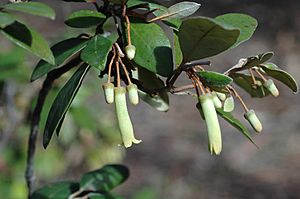Correa lawrenceana var. glandulifera facts for kids
Quick facts for kids Mountain correa |
|
|---|---|
 |
|
| A Mountain Correa growing in a garden | |
| Scientific classification |
|
| Kingdom: | Plantae |
| Clade: | Tracheophytes |
| Clade: | Angiosperms |
| Clade: | Eudicots |
| Clade: | Rosids |
| Order: | Sapindales |
| Family: | Rutaceae |
| Genus: | Correa |
| Species: | |
| Varietas: |
C. l. var. glandulifera
|
| Trinomial name | |
| Correa lawrenceana var. glandulifera Paul G.Wilson
|
|
| Synonyms | |
|
|
The Mountain Correa (Correa lawrenceana var. glandulifera) is a special type of plant found only in eastern Australia. It's often called the mountain correa because it grows in mountain areas. This plant can be a bush or a small tree. It has leaves shaped like eggs and pretty greenish-yellow flowers. These flowers often have soft, woolly hairs on the outside. You might see them growing alone or in small groups of up to five flowers.
What it Looks Like
The Mountain Correa is usually a shrub, which is a type of bush, growing about 3 to 6 metres (10 to 20 feet) tall. Sometimes, it can even grow into a small tree, reaching up to 12 metres (39 feet) high!
Its leaves are shaped like an egg or a spear. They are usually 40 to 80 millimetres (1.6 to 3.1 inches) long and 20 to 35 millimetres (0.8 to 1.4 inches) wide. The underside of the leaves feels soft and woolly because it's covered in tiny hairs.
The flowers grow at the ends of the branches. Each flower sits on a short stalk called a peduncle, which is about 4 millimetres long. Then, each individual flower has its own smaller stalk, called a pedicel, which is 4 to 10 millimetres long.
The bottom part of the flower, called the calyx, looks like a small cup about 2 millimetres long with a wavy edge. The main part of the flower, the corolla, is shaped like a narrow tube. It's about 22 to 27 millimetres (0.9 to 1.1 inches) long and is greenish-yellow. Just like the leaves, the outside of the corolla is covered in soft, woolly hairs. You'll mostly see these flowers blooming in the spring.
How it was Named
The Mountain Correa was officially named and described in 1961. A scientist named Paul Wilson gave it its formal name. He wrote about it in a scientific paper called Transactions of the Royal Society of South Australia.
The plant samples he used to describe it were collected by another person, Cyril Tenison White. Cyril found these plants near a place called Springbrook, Queensland in 1929. They were growing high up in the mountains, about 3000 feet (914 metres) above sea level.
Where it Lives
This type of Mountain Correa grows in the mountains of eastern Australia. You can find it on the edges of rainforests. Its home stretches from the Gibraltar Range in New South Wales all the way up to the McPherson Range in the far south-eastern part of Queensland.

